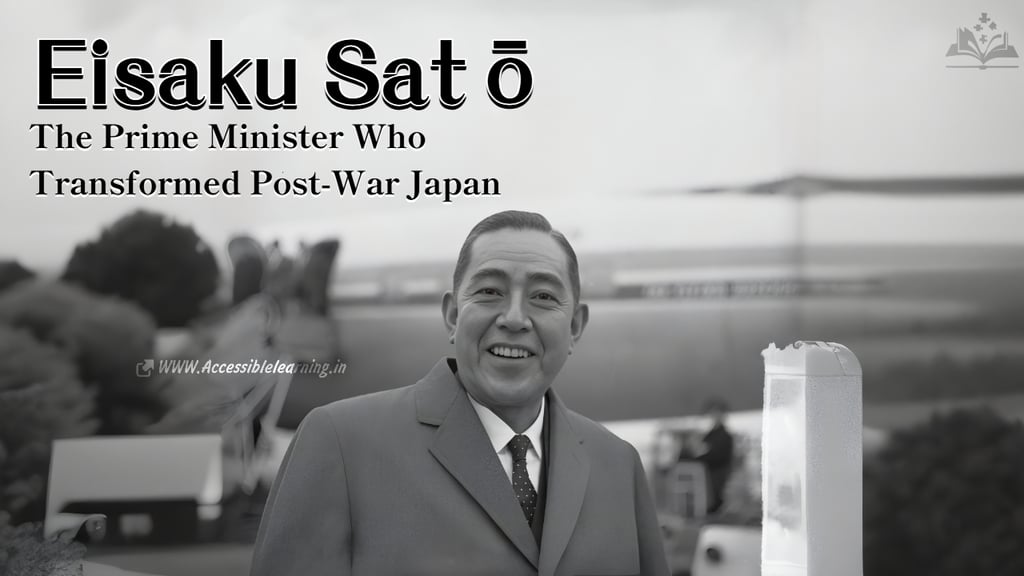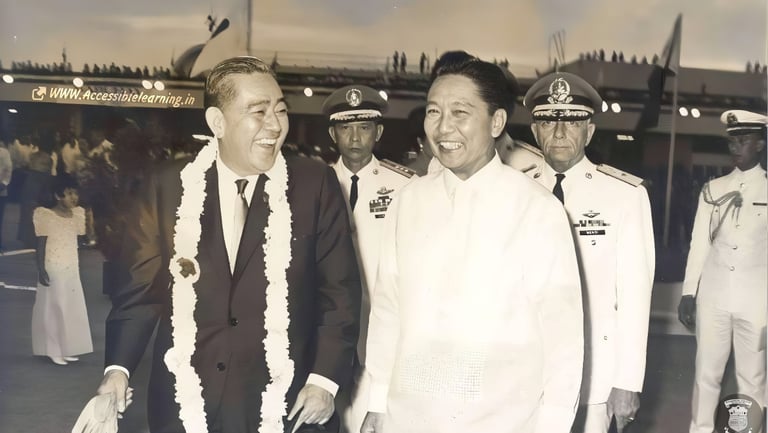
How Eisaku Satō Shaped Japan’s Nuclear Policy and U.S. Relations
Eisaku Satō, Japan’s longest-serving Prime Minister of the 20th century, played a crucial role in economic growth, nuclear non-proliferation, and Okinawa’s reversion. Learn about his leadership, diplomatic achievements, and legacy in shaping modern Japan.
JAPAN HISTORYEMPIRES/HISTORYBIOGRAPHYTHE GREAT LEADERPOLITICAL JOURNEY
Kim Shin
2/5/20253 min read


Eisaku Satō was a defining figure in post-war Japanese politics, serving as the country's longest-tenured prime minister of the 20th century. His leadership was marked by economic growth, diplomatic achievements, and a strong pro-American stance. He played a crucial role in Japan's return to the global stage, securing Okinawa's reversion and promoting nuclear non-proliferation, earning him the Nobel Peace Prize in 1974. This article explores his life, political career, and lasting legacy.
Early Life and Political Rise
Born on March 27, 1901, in Tabuse, Yamaguchi Prefecture, Eisaku Satō hailed from a politically influential family. His elder brother, Nobusuke Kishi, was also a prominent politician and later became Japan's Prime Minister. Satō graduated from Tokyo Imperial University and entered the Ministry of Railways in 1924, where he established a reputation as an efficient bureaucrat.
His transition into politics came in 1949 when he was elected to the House of Representatives as a member of the Liberal Democratic Party (LDP). He quickly climbed the ranks, holding various ministerial positions, including Minister of Finance and Minister of Construction, before assuming the Prime Minister's office in 1964.
Leadership as Prime Minister (1964-1972)
Satō's tenure as Japan's Prime Minister from 1964 to 1972 was a period of rapid economic expansion, diplomatic realignments, and key domestic reforms. His leadership was characterized by:
Economic Growth and Technological Advancement
Satō oversaw Japan's meteoric rise as an industrial and economic powerhouse. During his time in office:
The Japanese economy grew at an annual rate of nearly 10%, thanks to investments in infrastructure and technology.
He prioritized science and technology, leading to Japan's first satellite launch in 1970.
The Osaka Expo 1970 showcased Japan's modernization to the world.
He emphasized the expansion of the automobile and electronics industries, solidifying Japan's status as a global leader in these fields.
Okinawa Reversion and U.S.-Japan Relations
One of his most significant diplomatic achievements was negotiating the return of Okinawa from U.S. control to Japan in 1972. While Japan regained sovereignty over Okinawa, Satō maintained the Japan-U.S. Security Treaty, reinforcing Japan's alignment with the West during the Cold War.
He also strengthened Japan's ties with the United States by ensuring continued economic and military cooperation. His diplomacy helped stabilize the Asia-Pacific region during a period of heightened Cold War tensions.
The Three Non-Nuclear Principles
Satō was instrumental in shaping Japan's nuclear policy. He introduced the Three Non-Nuclear Principles:
Not to possess nuclear weapons
Not to produce nuclear weapons
Not to allow nuclear weapons on Japanese soil
This policy earned him international recognition and the Nobel Peace Prize in 1974, making him the first Japanese recipient of the award. However, declassified U.S. documents later suggested that his administration had secret understandings regarding U.S. nuclear-armed vessels docking in Japan, creating controversy over his nuclear stance.
Domestic Policies and Social Reforms
He expanded healthcare and welfare programs, addressing post-war social inequalities.
Under his leadership, Japan's Shinkansen (bullet train) network expanded, modernizing public transportation.
He faced student protests and growing concerns about environmental issues due to rapid industrialization.
Introduced pollution control measures, including stricter environmental regulations to curb industrial waste and air pollution.
Diplomatic Expansion Beyond the U.S.
Improved relations with Southeast Asian nations, fostering trade and diplomatic engagements.
He initiated efforts to normalize ties with China, though full diplomatic recognition was achieved after his tenure.
Strengthened Japan's role in international organizations like the United Nations and OECD.


Challenges and Resignation
Despite his successes, Satō faced increasing criticism towards the end of his tenure. Public unrest over U.S. military bases in Japan, the Vietnam War, and internal power struggles within the LDP weakened his support. In 1972, he stepped down and was succeeded by Kakuei Tanaka.
Later Years and Death
After his resignation, Satō remained an influential figure in Japanese politics. He was awarded the Nobel Peace Prize in 1974, alongside Seán MacBride, for his efforts in nuclear disarmament. However, his later years were marred by revelations about secret nuclear agreements between Japan and the U.S.
Satō passed away on June 3, 1975, at the age of 74. His legacy continues to shape Japan’s political landscape, particularly in economic policies and nuclear diplomacy.
Legacy and Impact
Satō left an indelible mark on Japan’s post-war development. His contributions to economic growth, diplomacy, and nuclear non-proliferation continue to shape Japan's policies today. His Nobel Peace Prize was a testament to his commitment to peace and diplomacy.
Eisaku Satō was more than just a prime minister; he was a statesman who steered Japan through a transformative era. His leadership strengthened Japan’s economy, redefined its foreign relations, and cemented its stance on nuclear disarmament. Today, he remains a pivotal figure in Japan's modern history, symbolizing diplomacy, progress, and peace.
Subscribe to our newsletter
All © Copyright reserved by Accessible-Learning
| Terms & Conditions
Knowledge is power. Learn with Us. 📚


